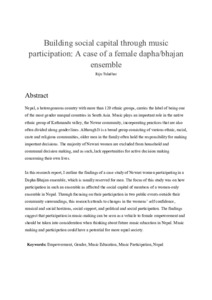Building social capital through music participation: A case of a female dapha/bhajan ensemble
Tuladhar, Riju (2018)
Tuladhar, Riju
Taideyliopiston Sibelius-Akatemia
2018
Kirjallinen työ
Julkaisun pysyvä osoite on
https://urn.fi/URN:NBN:fi-fe2018053125075
https://urn.fi/URN:NBN:fi-fe2018053125075
Tiivistelmä
Nepal, a heterogeneous country with more than 120 ethnic groups, carries the label of being one of the most gender unequal countries in South Asia. Music plays an important role in the native ethnic group of Kathmandu valley, the Newar community, incorporating practices that are also often divided along gender lines. Although It is a broad group consisting of various ethnic, racial,
caste and religious communities, older men in the family often hold the responsibility for making important decisions. The majority of Newari women are excluded from household and communal decision making, and as such, lack opportunities for active decision making concerning their own lives.
In this research report, I outline the findings of a case study of Newari women participating in a Dapha/Bhajan ensemble, which is usually reserved for men. The focus of this study was on how participation in such an ensemble as affected the social capital of members of a women-only ensemble in Nepal. Through focusing on their participation in two public events outside their
community surroundings, this research attends to changes in the womens’ self confidence, musical and social horizons, social support, and political and social participation. The findings suggest that participation in music-making can be seen as a vehicle to female empowerment and should be taken into consideration when thinking about future music education in Nepal. Music
making and participation could have a potential for more equal society.
caste and religious communities, older men in the family often hold the responsibility for making important decisions. The majority of Newari women are excluded from household and communal decision making, and as such, lack opportunities for active decision making concerning their own lives.
In this research report, I outline the findings of a case study of Newari women participating in a Dapha/Bhajan ensemble, which is usually reserved for men. The focus of this study was on how participation in such an ensemble as affected the social capital of members of a women-only ensemble in Nepal. Through focusing on their participation in two public events outside their
community surroundings, this research attends to changes in the womens’ self confidence, musical and social horizons, social support, and political and social participation. The findings suggest that participation in music-making can be seen as a vehicle to female empowerment and should be taken into consideration when thinking about future music education in Nepal. Music
making and participation could have a potential for more equal society.
Kokoelmat
- Kirjalliset opinnäytteet [1403]
